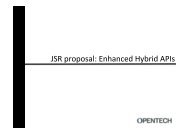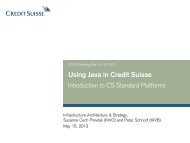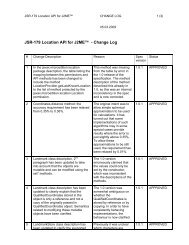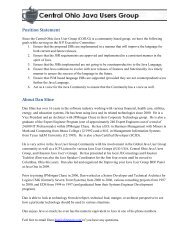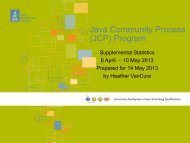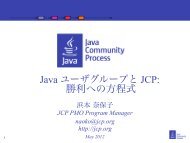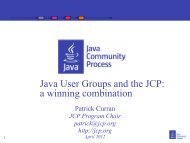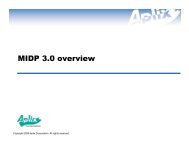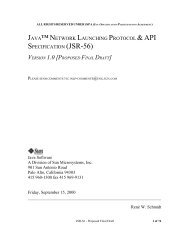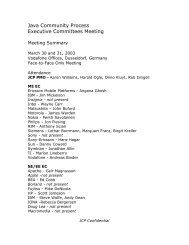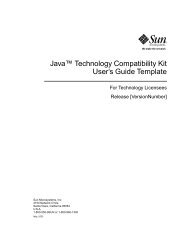JSR-000058 Java TM 2 Platform, Enterprise Edition 1.3 Specification
JSR-000058 Java TM 2 Platform, Enterprise Edition 1.3 Specification
JSR-000058 Java TM 2 Platform, Enterprise Edition 1.3 Specification
You also want an ePaper? Increase the reach of your titles
YUMPU automatically turns print PDFs into web optimized ePapers that Google loves.
3.5.2 Caller Authorization<br />
A J2EE product must enforce the access control rules specified at deployment<br />
time (see Section 3.6, “Deployment Requirements”) and more fully described in<br />
the EJB and Servlet specifications.<br />
It must be possible to configure a J2EE product so that the propagated caller<br />
identity is used in authorization decisions. This is, for all calls to all enterprise<br />
beans from a single application within a single J2EE product, the principal name<br />
returned by the EJBContext method getCallerPrincipal must be the same<br />
as that returned by the first enterprise bean in the call chain. If the first<br />
enterprise bean in the call chain is called by a servlet or JSP page, the principal<br />
name must be the same as that returned by the HttpServletRequest method<br />
getUserPrincipal in the calling servlet or JSP page. (However, if the<br />
HttpServletRequest method getUserPrincipal returns null, the<br />
principal used in calls to enterprise beans is not specified by this specification,<br />
although it must still be possible to configure enterprise beans to be callable by<br />
such components.) Note that this does not require delegation of credentials, only<br />
identification of the caller. This principal must be the principal used in<br />
authorization decisions for access to all enterprise beans in the call chain. The<br />
requirements in this paragraph apply only when a J2EE product has been<br />
configured to propagate caller identity.<br />
J2EE products must also support the Run As capability that allows the<br />
Application Component Provider and the Deployer to specify an identity under<br />
which an enterprise bean or web component must run. In this case the original<br />
caller identity is not propagated to subsequent components in the call chain;<br />
instead the Run As identity is propagated. Note that this specification doesn’t<br />
specify any relationship between the Run As identity and any underlying<br />
operating system identity that may be used to access system resources such as<br />
files.<br />
3.6 Deployment Requirements<br />
The deployment descriptor describes the contract between the Application<br />
Component Provider or Assembler and the Deployer. All J2EE products must<br />
implement the access control semantics described in the EJB, JSP, and Servlet<br />
specifications, and provide a means of mapping the deployment descriptor<br />
security roles to the actual roles exposed by a J2EE product.<br />
3-20 <strong>Java</strong> 2 <strong>Platform</strong> <strong>Enterprise</strong> <strong>Edition</strong>, v<strong>1.3</strong> Proposed Final Draft (Sun Microsystems, Inc.)



